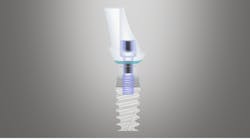Technology in Two Minutes: Drawing on automotive and aerospace technologies to create dental implant tech
A significant amount of science goes into making an implant. Concerns for stability, osseointegration, and avoiding infection loom large over how implants are designed. Sometimes, visionaries look to other industries to understand what has improved their processes. Industry giants like Ferrari, Jaguar, Tesla, Maserati, Mercedes, Aston Martin, NASA, and Formula One have reputations for excellence, and a big part of that is the ability to manufacture to a submicron level. In challenging environments such as the space race or a Grand Prix, failure is not an option. Failure should also not be an option in the implant process. That’s why Ditron Dental USA adopted manufacturing technologies from their automotive and aerospace divisions to create their Ultimate and Molecular Precision implants.
Related reading:
- Technology in two minutes: How a 3D navigation system can set your implantology practice apart
- CandidPro: The clear aligner therapy that soars
- Plugging in instead of blowing air
The precision manufacturing that sets automotive and aerospace icons apart is also integral to the dental implant, especially the fit between the abutment and the implant, what the company calls “MolecuLock biomechanical implant seal technology.” It is all about the molecular connection. The implant uses a biomechanical dental implant-abutment seal designed to reduce microgaps to less than 0.05 microns, which eliminates microleakage and bacterial penetration. Ditron is one of three companies in the world able to manufacture titanium to a submicron level. The elimination of the microgap is an important part of fighting peri-implant disease and protecting the crestal bone.
Precision was the goal when grade 23 titanium alloy was chosen for the implants and abutments. To understand this, it is important to know that the most widely used titanium alloy is Ti 6Al 4V, which has a reputation for biocompatibility, especially with direct contact with tissue or bone. Grade 23 titanium, also known as Ti 6Al 4V ELI (grade 23) is tweaked to have some special characteristics that are integral to the implant process. Grade 23 contains reduced levels of oxygen, nitrogen, carbon, and iron that provide improved ductility and better fracture toughness. Also in the mix is 6% aluminum that increases the hardness and reduces weight. It may not seem that including alloys such as aluminum and vanadium in an implant would have a big effect on the process, but they actually reduce the thermal conductivity and wear resistance by about 50%.
Precision also means reducing micromovements that can slow down or interfere with osseointegration. Double Stressless Sharp Threads allow the implant threads to adapt to the bone precisely, also promoting initial stability.
When I get into the driver’s seat, I like to know that my vehicle was produced with precision, technology, and materials to get me where I’m going safely and effectively. With a shared history and expertise in precision manufacturing, Ditron has integrated this technology as its vehicle in implant manufacturing as well.
Editor’s notes: Ditron is among Dental Economics’ recent financial supporters.
This article appeared in the February 2023 print edition of Dental Economics magazine. Dentists in North America are eligible for a complimentary print subscription. Sign up here.







